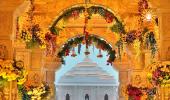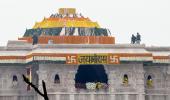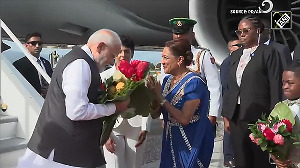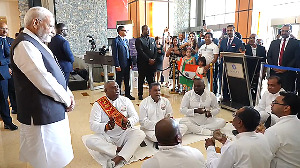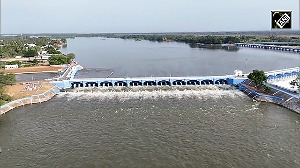Prime Minister Narendra Modi said on Monday the consecration of the idol of Ram Lalla in Ayodhya marks the advent of a new era and gave a call to people to go beyond the Ram temple's construction to build the foundation of a strong, grand and divine India of the next 1,000 years.

After participating in the idol's 'pran pratishtha', Modi said in the address to a large number of invitees, including seers, leading figures from different fields and those part of the decades-long agitation for building the temple, that the momentous occasion is not merely about triumph but also humility and underscores Indian society's maturity in resolving historical disputes.
In remarks aimed at critics, he said some people used to say that the Ram temple's construction would set off a fire in the country and asked them to reconsider their views.
Ram is not fire but energy, Ram is not dispute but solution, Ram is not merely ours but of everyone and Ram is not only the present but also eternal, he said, adding that the temple is also a symbol of peace, patience, harmony and amity in Indian society.
Ram defines the spirit of 'Vasudhaiva Kutumbkam' (the world is a family), Modi said.
With his speech being heard across the country, he sought to strike an emotional chord with the masses saying 'our Ram' has arrived after wait, patience and sacrifices of centuries.
"Our Ram Lalla will no longer live in a tent. Our Ram Lalla will stay in a magnificent temple," Modi said in his 36-minute speech.
He urged everyone to do their bit in building a strong, capable, grand and divine India, saying they should not miss out at a time when the country is passing through a positive and constructive period. There is not an iota of space for any despondency, he said.
India will be guided by traditions, heritage and modernity to reach its goals, he said.
With the temple being built and divine powers 'witnessing' the occasion, he asked people to take a pledge in the current time of immense 'positive energy' to build a strong and capable India of the next 1,000 years after the temple has been built.
"Ayodhya is asking us all, every devotee of Ram, every Indian as to the next course of action as the grand temple of Shri Ram has been built. What next? We have to from today, from this sacred moment lay the foundation of India of the next 1,000 years. Going beyond the temple's construction, we all Indians take a pledge to build a strong, capable, grand and divine India," he said.
The Ram temple, the prime minister said, will be a witness to India's rise and dawn of a developed and magnificent India.
January 22, 2024, is not merely a date but marks the advent of a new era, he added.
He said he would seek forgiveness from Lord Ram as the deity had to endure a wait of centuries and his existence was questioned even after the original copy of the independent India's Constitution carried his illustration.
There must be some shortcomings in us, he said before thanking the Supreme Court for doing justice and paving the way for the temple's construction at the once disputed site by law.
The 16th Century Babri mosque had stood at the site, whose ownership was a matter of contesting claims in courts before a frenzied mob of 'kar sevaks' tore it down in 1992.
A five-judge constitution bench of the Supreme Court in November 2019 ruled unanimously in favour of the Hindu group, ending the protracted dispute around the site which devotees believe to be the birthplace of Lord Ram.
The temple, built in the traditional Nagara style of architecture, spans 380 feet in length (east-west), 250 feet in width and 161 feet in height. It is supported by 392 pillars and has 44 doors.
The prime minister told the gathering he could still feel the divine vibrations he experienced during the consecration ceremony inside the sanctum sanctorum.
"The construction of Ram Mandi has filled people with a new energy."
People will remember this date, this moment even after thousands of years, he said.
"It is Ram's supreme blessing that we are witnessing it."
While many countries have at times plunged into more difficulties in an attempt to untangle old historical knots, Indian society has shown its maturity by resolving the dispute with such maturity and amity, he said.
Modi said the entire world was connected with this 'pran pratishtha' ceremony as celebrations similar to those witnessed in Ayodhya were seen in other countries as well.
"Ram is India's faith... Ram is the basis of India, Ram lays down the rules in India, Ram is India's consciousness, Ram is India's pride, Ram is India's glory, Ram is India's influence, Ram is overarching.
"Therefore, when Ram is consecrated it has an effect not just for years and centuries but for thousands of years," Modi said.
He said he was experiencing the changing times with a pure mind.
"It is a happy coincidence that our generation has been chosen to be the architect of an era transcending time. Even after 1,000 years, the generation will remember our works of nation-building," Modi said.
"That is why I say this is the time, this is the right time. From this auspicious moment, we have to lay the foundation of an India of the next 1000 years. Moving ahead of the temple construction, all the people of the country from this moment resolve to build a capable, grand and divine India," he said.
Modi also offered prayers at Kuber Tila and showered flower petals on the construction workers of the Ram Temple.
Most opposition leaders invited to the event skipped the ceremony, accusing his government of making it a political exercise with an eye on the coming Lok Sabha polls.

